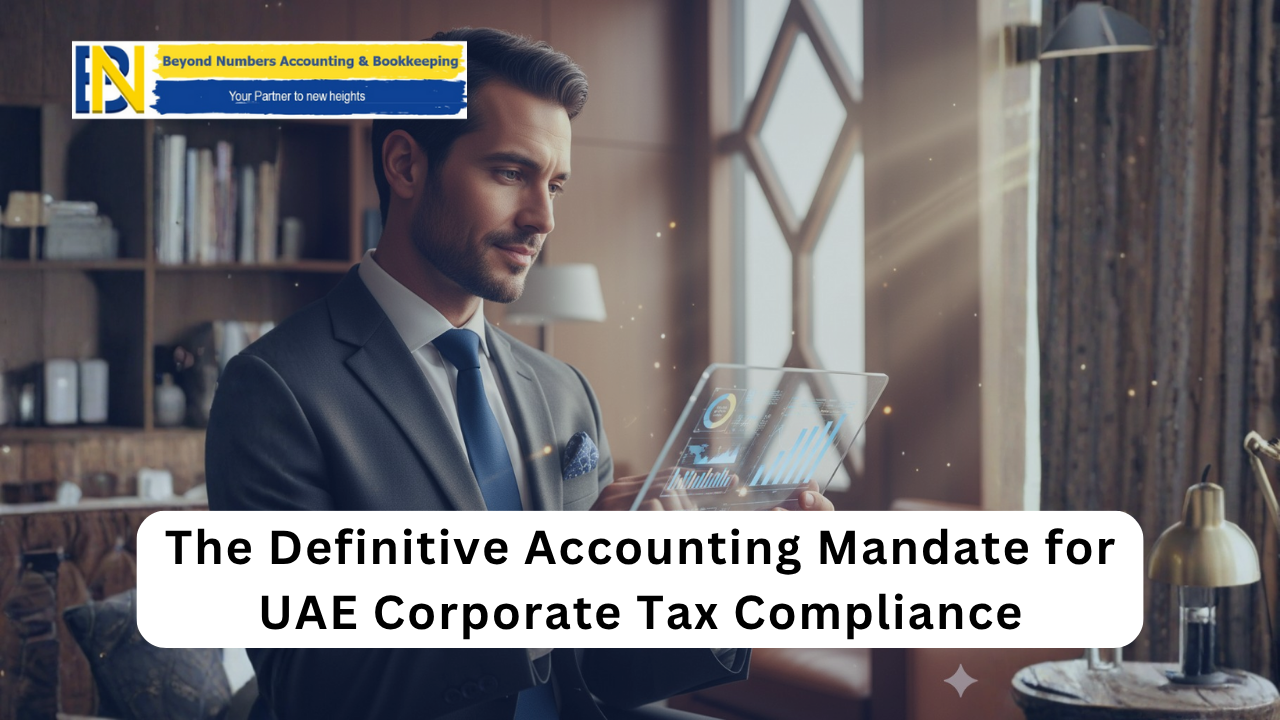The introduction of the UAE Corporate Tax (CT) regime marks a strategic turning point in the nation’s fiscal policy, fundamentally altering the Corporate Tax Compliance and financial reporting prerogatives of nearly every business operating within the Emirates. CT compliance is unreservedly anchored in the quality, structure, and accessibility of a taxable person’s accounting records, transforming meticulous record-keeping from a best practice into a legal necessity. Failure to align accounting functions with the new CT stipulations introduces significant regulatory risk and the potential for substantial penalties, directly undermining effective Corporate Tax Compliance.
The Foundation: Accounting Standards and Record Retention
The Federal Tax Authority (FTA) has mandated specific standards and retention periods to ensure transparency and facilitate efficient audits for Corporate Tax Compliance.
- Applicable Accounting Standards: Taxable entities must prepare their financial statements based on International Financial Reporting Standards (IFRS) or IFRS for Small and Medium-sized Entities (SMEs). This requirement strengthens the financial reporting framework, ensuring consistency and global benchmarking essential for Corporate Tax Compliance.
- Crucially, the CT Law uses the net accounting profit reported under these standards as the starting point for calculating Taxable Income.
- The transition necessitates that businesses review their current policies, particularly concerning areas like revenue recognition, asset valuation, and the treatment of deferred taxes (IAS 12), which can be materially impacted by the new tax regime.
- Mandatory Record Retention Period: All Taxable Persons, including those claiming a 0% tax rate or those who are exempt, are obligated to maintain all records and supporting documentation for a minimum of seven (7) years following the end of the relevant Tax Period. This provision underscores the importance of data retrieval and archival robustness for long-term Corporate Tax Compliance.
Core Documentation Requirements: Beyond Financial Statements
While audited financial statements form the cornerstone of the CT return, Corporate Tax Compliance requires the meticulous maintenance of comprehensive supporting documentation that enables the FTA to readily ascertain the Taxable Income.
| Category | Required Records/Documentation | Business Implication/Purpose |
| Financial Statements | Audited Balance Sheet, Income Statement, Cash Flow Statement, and Notes. | Determines the accounting profit/loss, which is the baseline for CT calculation. |
| Transaction Records | General Ledger, Sales and Purchase Invoices, Order Records, Receipts, Vouchers, and Contracts. | Validates all income and expense figures and supports the application of the deductibility rules for Corporate Tax Compliance. |
| Asset Documentation | Fixed Asset Register (detailing acquisitions, disposals, and depreciation). | Supports the claim for deductible depreciation and amortization expenses. |
| Banking & Finance | Bank Statements, Loan/Financing Agreements, and Bank Reconciliations. | Verifies cash flow and substantiates interest expense claims (subject to the interest deduction cap). |
| Tax Adjustments | Schedules detailing all tax adjustments made to the accounting profit (e.g., non-deductible expenses, exempt income). | Crystallizes the calculation from accounting profit to the final taxable income. |
Strategic Compliance Areas: Transfer Pricing and Free Zones
Two areas demand heightened diligence and specific accounting support to mitigate significant Corporate Tax Compliance risks: Transfer Pricing (TP) and Qualifying Free Zone Persons (QFZPs).
- Transfer Pricing (TP) Documentation: The UAE has adopted the Arm’s Length Principle for transactions with Related Parties and Connected Persons. Accounting records must substantiate that these transactions are conducted on arm’s length terms.
- TP Disclosure Form: Mandatory for entities meeting specific revenue or related-party transaction thresholds (e.g., aggregate related-party transactions exceeding AED 40 million).
- Master File and Local File: Required for MNE groups and large local entities exceeding specified revenue thresholds (e.g., global revenue $\geq$ AED 3.15 billion). The accounting data is paramount for the benchmarking studies within these files.
- Qualifying Free Zone Persons (QFZPs): QFZPs benefit from a 0% CT rate on Qualifying Income, provided that strict substance and compliance rules are met. The accounting imperative here for Corporate Tax Compliance is the segregation of accounts.
- Separate Accounting: QFZPs must maintain separate books for Qualifying Income (0% tax) and Non-Qualifying Income (taxed at 9%).
- Substance Documentation: Financial records must demonstrate adequate economic substance within the Free Zone, supporting the claim of Core Income-Generating Activities (CIGA) and related expenditure.
What Should Businesses Do Now?
To navigate the evolving landscape effectively, you must execute a proactive planning mandate for seamless Corporate Tax Compliance:
- System Upgrade and Alignment: Ensure your current accounting software is capable of generating IFRS-compliant financial statements and segregating income/expenses as required for Free Zone status or complex adjustments.
- Internal Control Review: Conduct an internal review to strengthen financial controls, especially over related-party transactions, to ensure data accuracy and integrity prior to external audit.
- Audit Readiness: Prepare all supporting schedules, particularly the tax adjustment schedules, in advance of the statutory nine-month filing deadline.
- Consultation: Engage a professional tax advisor to review your accounting policies and documentation against the latest Ministerial Decisions to mitigate exposure to administrative penalties and ensure robust Corporate Tax Compliance.
This new fiscal chapter necessitates that businesses reassess their entire financial architecture. The adherence to meticulous accounting and robust documentation is not just about avoiding penalties, it is about ensuring business continuity and operational resilience within the globally competitive UAE environment through effective Corporate Tax Compliance.

